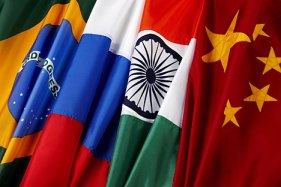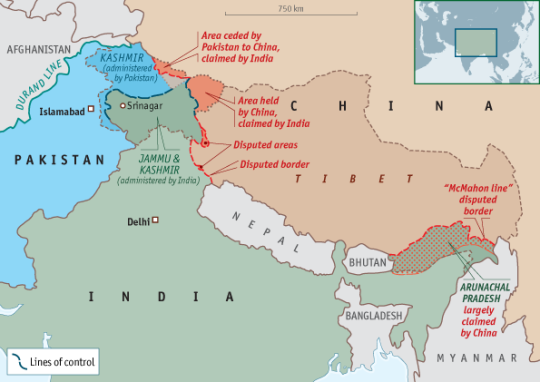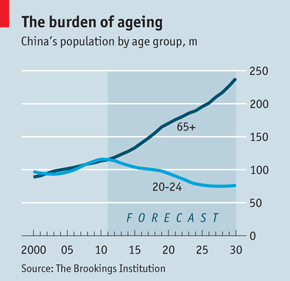Tagged: Balance of Power
The Era of the Eagle – American Hegemony is Here to Stay
Although there exists much discussion on ‘American decline’ and the rise of a multipolar power-balance within the international state system, the truth is the globe will remain unipolar and dominated by the United States – the world’s single great-power – for some time to come. To prove this, I will examine America’s potential competitors in the international state system (Brazil, Russia, India, China, and a unified Europe) and display none will be able to reach American-level global influence. Thus none will truly reach ‘great-power’ status in the near future.
For centuries leading up to 1900 the international state system was dominated by a multitude of European great powers. The world wars of the early 20th century were the culmination of this power-balance. The end of the Second World War marked the beginning of a bipolar global order; the Cold War would last for almost 50 years and see two great-powers vie for dominance. The fall of the Berlin Wall and the collapse of the Soviet Union ended the bipolar world order and began a period of unipolar American dominance. Many believe the international state system is entering another multipolar period of power-sharing wherein the United States constitutes one ‘pole’ while other nations hold a similar level of global influence. However the fact is Washington will continue to dominate the global order for some time to come, although some nation-states may grow more powerful in their respective regions.
‘Great-Power’ and Multipolar Defined
The world is certainly already multipolar economically, as a single entity Europe’s economy is the world’s largest, and the world is seen to have three economic poles – the US, Europe, and China. However ‘great-power’ is not an economic turn. In the modern globalized economy many countries can have economic growth simultaneously and benefit one another’s economies. In the anarchic environment that is international state system the security of one state almost always come at the expense of another. Thus ‘great-power’ constitutes more than economic power alone, it must constitute the projection of military power on the world stage. This definition works throughout history, the pre 1900 great-powers projected military influence globally. Britain, France, Russia, Spain, Prussia/Germany, Austria, and the Ottoman Empire possessed economic and military influence, not economic influence alone. When these countries industrialized, Japan and the United States became great-powers as well. The United States and the Soviet Union possessed both economic and military influence during the bipolar world order. But keep in mind, economic strength can allow a nation-state to buy military capability; money is power.
The Current Unipolar Power Structure
Today only one nation-state can truly project force globally, the United States. America almost invests the same amount in its military manpower and equipment as the rest of the world combined. Its massive naval fleet contains an unprecedented eleven carriers strike groups, this allows America to control the world’s oceans in their entirety, not just its territorial water. America’s air force is also truly unrivaled and highly mobile as it can be focused from both sea or any of America’s worldwide military bases. Its dominance of outer space and cyberspace is nearly as impressive. Therefore the world is currently unipolar. To become truly multipolar the United States must have several equals that rival its hegemony, these states do not need to be exactly as capable militarily as the United States, but they must achieve true great-power status and be capable of projecting military force globally. This will be the essential point when proving the world will remain unipolar for some time to come.
The Potential ‘Poles’ of a Multipolar Global Order
BRIC – although mainly an economic term – has come to resemble to nation-states that are seen to be emerging contenders in the world order. I will label these states and a unified Europe as possible ‘poles’ in the new multipolar world order. The BRIC nations (Brazil, Russia, India, China) could potentially join the United States as equal powers on the international state system. Europe too is often seen as a contender to become a single ‘pole’ in the global order, it certainly already is economically, but it has yet to be able to project a true unified influence on the world stage and thus cannot yet be deemed a single great-power. To refute the notion that the world order is on the verge of becoming multipolar, I will examine each of these potential ‘poles.’ Keep in mind that to become truly multipolar each of these ‘poles’ must constitute a similar degree of international power. I will not refute the fact that some if not all of these nations are gaining influence.
 BRIC Forecasts are Fundamentally Overrated
BRIC Forecasts are Fundamentally Overrated
There currently exists a misconception that the BRIC nations are on course to surpass or match the US economy in the near future. This notion is fundamentally flawed. Forecasting the future is near impossible. The typical business cycles last around five years, forecasting beyond two or three of these cycles is useless. Thus predicting change beyond a decade in the future is unwise. Furthermore, the emerging markets’ economies took off during the 1990s due to a global flood of foreign money. This money is drying up, the BRICs are unlikely to maintain the growth they enjoyed during the last decade into the next. Nonetheless, I will examine each BRIC nation in detail.
Brazil’s Economic Challenges
Brazil is probably the BRIC nation that is least likely to make up a ‘pole’ in the new global order of great-powers. Its economy is over dependent on surging demand for its resources, mainly oil, copper, and iron ore. While China has invested heavily in infrastructure to accommodate future economic growth, Brazil has invested heavily in creating a welfare-state. Socially a welfare-state is certainly a good thing, but this also means Brazil is unlikely to see substantial growth in the decades to come. Without substantial growth Brazil will be unable to field a military capable of projecting power on the global stage, and its current military expenditure is below that of any of the other BRIC nations. It is also the only BRIC nation to not possess nuclear weapons, a near prerequisite to great-power status. Furthermore Brazil is located in South America , often considered America’s ‘back-yard.’ It has little to benefit developing a military capable of rivaling Washington, and indeed a lot to lose. Brazil does have great potential to become a leader in South America, but as to becoming great-power its prospects are nil.
Russia’s Fundamental Problems
Unlike Brazil, Russia inherited a massive collection of military hardware from the Soviet Union, has a massive nuclear arsenal. and is a member of the Security Council, however Russia’s economic problems are much more troubling. Post-Soviet Russia has steadily registered more deaths than births. In fact Russia’s federal statistics agency lists about 12.5 million more burials than deliveries for 20 years. Only Mao’s Great Leap Forward has caused a larger death to birth ratio globally since World War 2. But depopulation is not the only thing challenging the Russian economy, although many Russians are educated, patent applications and the output of scientific papers is surprisingly low. This does not bode well for innovation. Furthermore the Russian economy depends far too heavily on oil and gas exports. All of this points to future stagnation. Russia’s economic outlook is so poor, The Economist declares Russia should have never been included in the BRIC foursome, it owes its status to an “accident of geology – those oil and gas deposits” rather than “creativity or innovation.” Sharma infers Russia only gained BRIC statues because the acronym sounds better with a R. Without a strong economy, Russia will be unable to compete with the United States, Europe, or the other BRIC nations. Barring economic challenges, Russia’s resource-poor neighbor is a rising China. It is thus more likely that Russia will continue to secure its own borders than attempt to project its power on the world stage.
Russia will continue jeopardise the security of its neighbours. In The Wiley Bear – Russian Motives for the Nord Stream Pipeline I argued it was using Europe’s gas dependency to gain influence over Eastern Europe. However this alone does not constitute great-power status.
India – Cursed by Geography
India’s economic growth is set to outpace China’s, however its ability to project itself globally will not happen before it overcomes some fundamental challenges. I argue India is cursed by its geography. It is caught in two unresolved border conflicts, one with Pakistan (India’s bitter rival), and one with China (the regions other great-power contender). Since India and Pakistan were partitioned in 1947 they have fought three wars (1947-48, 1965, 1999) over Kashmir. These disputes create political opportunity costs for India’s foreign power. India is more likely to focus on regional power-games, worldly aspirations will likely be put on the back-burner for the near future. Furthermore, India’s extreme economic growth rates are probably overrated. Pessimists point to India’s lousy infrastructure and a shortage of skilled workers as serious economic restraints.
China’s Demographic Challenges
I do not argue that China is not going to gain power in the international state system. China is almost certainly the contender most likely to match American great-power status in the near future (I would rank India as a close second). But it is unnecessary to assume China will somehow be able to match the United States as a great-power. China faces fundamental economic challenges. China’s one-child policy means in a few years China’s workforce will begin to shrink, and a larger percentage of the population will need to be supported by the working age population. Furthermore, China has been experiencing an economic ‘sugar-rush’ in recent years. It is now reaching what economists call “‘the Lewis turning point.’” The rural population has been moving to urban areas and this surplus workforce benefits the economy. However when this surplus labor is exhausted – when roughly half the population is urbanized – the country reach its ‘Lewis turning point,’ and the economic boost is exhausted.
China does seem to be acquiring capabilities to rival the United States militarily. In The Dragon’s Navy – Chinese Capabilities and American Policy, I argued China’s Anti-Access/Area Denial capabilities are being constructed with the purpose of rivaling American naval dominance. However this dominance was restricted to Western Pacific. Even if China does come to dominate the region (a notion that is hardly certain) this hardly constitutes great-power status. I also argued America must maintain hegemony in the region, this fact has probably also dawned on the Pentagon. Moreover China’s military still has hurdles to leap. One retired American admiral admits most of the military hardware China has bought from Russia is “junk.” It also takes many years of investment to master complex submarine and aircraft carrier warfare. Although no longer a peasant army, the People’s Liberation Army lacks experience fighting in the modern theater of war. Meanwhile the United States armed forces have been hardened by over 10 years of conflict. The PLA funding is still nowhere near that of the United States’ industrial-military complex, and as previously discussed China’s economy is unlikely to continue to grow at past rates. Furthermore China is checked by other powers in the region, India certainly will rival it in the near future and Japan is still considered Asia’s other ‘giant.’
 Europe, The ‘Retired-Power’
Europe, The ‘Retired-Power’
While ‘American decline’ may well turn out to be false, ‘European decline’ will almost certainly occur. Although Europe contains two permanent security council members with large defence budgets, the region will be restrained from projecting global military influence because of continental infighting. The underlying problem with the European Union is that it has a monetary union but no fiscal union, to solve the situation more integration is needed.
The argument that each time Europe has faced a crisis it has moved towards more unification, rather than less, rings hollow. Although the European Coal and Steel Community (the beginning of European integration) was established in the wake of World War 2 as a means to keep peace, and the 1992 Maastricht (which brought the EU into existence) was signed during the Bosnian war to bring peace to the region, the EU now faces a crisis unlike it has in the past. Past crises were wars and could be solved by integration, today’s crisis is one that has been brought about by integration.
Furthermore, Europe’s main military powers (Britain and France) are allied to the United States and dependent on American defense spending. Yugoslavia and Libya saw recent European-led conflicts, but American firepower is what made the campaign a reality. Although the EU or even the Euro are unlikely to disappear, I do not see Europe as becoming a ‘pole’ equal to American power. I stand by my assertion in NATO at a Crossroads – The Case for European Defense Cooperation that should Europe cooperate it could better project itself globally, however I do not see that cooperation happening in the near future. Although the EU might be an economic-superpower “it is a political dwarf when it comes to the rough-and-tumble world of global geopolitics.” (Rifkin) Despite the late 1990s launch of the European Security and Defense Policy, it has yet to develop into a ‘counterweight’ to the United States in global politics. Fundamentally Europe is too divided to possess a single foreign policy. In the terms of great-power status it is ‘retired,’ relying on the American military.
Thus American Hegemony and Unipolarity are Here to Stay
Finally, a critic of my argument could infer the presence on several ‘lesser-powers’ could make up a single ‘great-power,’ making the world multipolar. But this overlooks the fact that states gain power at the expense of others. It is inevitable that China and India will check one another’s power to a degree, given the mutual access to the region’s sea-lanes.
Many have begun to recognize the fact America will remain hegemonic for the near future. Thus the term ‘hierarchical multiporality’ has come to describe the new state-system. However this definition is essentially the same as unipolar. A single great-power exists, while several lesser-powers do as well – but the existence of a single great power is unipolarity.
American military force dominates the world stage, and it is likely to do this for some time. Any predictions that the world will soon be multipolar are fundamentally flawed. American hegemony is here to stay for the predictable future.
Works Cited
“58,500 tonnes of coincidence.” The Economist, 26 September 2012. http://www.economist.com/blogs/clausewitz/2012/09/chinas-aircraft-carrier
“A rivalry that threatens the world.” The Economist vol. 399 no. 8734, 21-27 May 2011.
“BRIC-a-brac: A memo on the next investment craze.” The Economist, The World in 2011.
Calder, Kent E. Foreign Affairs vol. 85 no. 2, March/April 2006.
Eberstadt, Nicholas. “The Dying Bear: Russia’s Demographic Disaster.” Foreign Affairs vol. 90 no. 6, November/December 2011.
“Fantasy Frontiers.” The Economist Online. 8 February 2012.
http://www.economist.com/blogs/dailychart/2011/05/indian_pakistani_and_chine e_border_disputes
“Friend or Foe? A special report on China’s place in the world.” The Economist vol. 397 no. 8711, 4 December 2010.
Ganguly, Sumit. “Will Kashmir Stop India’s Rise.” Foreign Affairs vol. 85 no. 4, July/August 2006.
“Going to town.” The Economist Online. 18 January 2012.
http://www.economist.com/blogs/graphicdetail/2012/01/daily-chart-6
Menon, Anand. Europe: The State of the Union. London: Atlantic Books, 2008.
“The most surprising demographic crisis.” The Economist. 5 May 2011.
http://www.economist.com/node/18651512
Parent, Joseph M. and Paul K. MacDonald. “The Wisdom of Retrenchment: America Must Cut Back to Move Forward.” Foreign Affairs vol. 90 no. 6, November/December 2011.
Rifkin, Jeremy. The European Dream: How Europe’s Vision of the Future is Quietly Eclipsing the American Dream. New York: Penguin Book Ltd., 2004.
Sharma, Ruchir. “Bearish on Brazil: The Commodity Slowdown and the End of the Magic Moment.” Foreign Affairs vol. 91 no. 3, May/June 2012.
Sharma, Ruchir. “Broken BRICs: Why the Rest Stopped Rising.” Foreign Affairs vol. 91 no. 6, November/December 2012.
“Vladimir II.” The Economist, The World in 2012.







